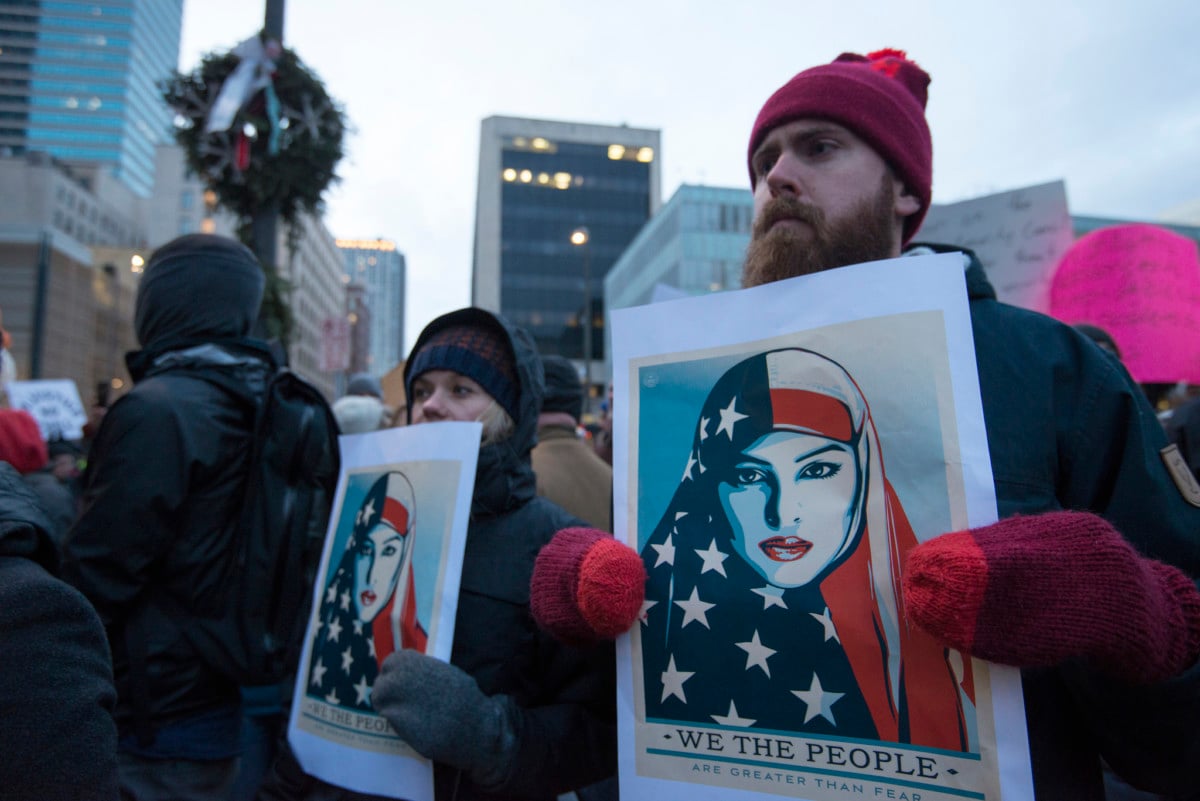Today is a big day for Sam Hamama, a Chaldean Christian who has lived in Michigan for 40 years with his wife and four children, and whom the Trump administration wants to deport to Iraq where he likely would be persecuted, tortured or killed. The federal Court of Appeals in Cincinnati is hearing arguments in our case to decide whether the administration can deport Hamama — as well as some 1,400 other Iraqi Americans — without giving them a chance for an immigration judge to consider the danger they face in Iraq. Today is also a big day for Hilal Alkateeb, a fellow Michigan resident and US citizen, whose Yemeni wife was barred from joining him in the US under the administration’s Muslim ban, the constitutionality of which is before the US Supreme Court this morning.
Hamama and Alkateeb’s lives, and their legal cases, are inextricably linked. Hamama faces danger in Iraq because he is Christian. But his life hangs in the balance in a Cincinnati courtroom today because of the Muslim ban, and specifically the administration’s efforts to paper over the fact that the Muslim ban was intended to harm families like Alkateeb’s. That effort to hide the Muslim ban’s true purpose is exactly the issue before the Supreme Court in Washington.
The link between Hamama and Alkateeb was born on the campaign trail when then-presidential candidate Donald Trump promised “a total and complete shutdown of Muslims entering the United States.” A week after the inauguration, he delivered, issuing Muslim ban 1.0, an executive order that enshrined anti-Muslim bigotry into national policy by barring people from seven predominantly Muslim countries including Iraq, and suspending refugee admissions, with an exception for Christian refugees.
Alkateeb’s family was among the thousands affected. Alkateeb met his wife, Rim, in Yemen. They married and had a baby. The immigration process for her to come to the US took so long that their US-citizen daughter is now a toddler. Under Muslim ban 1.0, Rim, despite being authorized to enter the US, could suddenly not join Alkateeb, and the family faced the stark choice of separating their daughter from her mother, or leaving both to risk their lives in Yemen, where Rim’s brother had been killed in a bombing. Ultimately, Alkateeb and his daughter joined our lawsuit in Michigan, which will be impacted by whatever the Supreme Court decides.
Courts halted Muslim ban 1.0 as a clear-cut example of religious discrimination. Rather than fight in court, Trump issued Muslim ban 2.0, removing the Christian exception and some of the most obvious anti-Muslim language. Iraq was removed from the list of banned countries, and part of the political quid pro quo was that Iraq would take back people like Hamama — longtime US residents with very old deportation orders. In June 2017, Hamama — whose wife and children are all US citizens — was arrested without warning for immediate deportation, along with hundreds of other Iraqis.
According to the US State Department, religious and ethnic minorities in Iraq — including Shia Muslims, Sunni Muslims, Yazidis and Christians like Hamama — face kidnapping, slavery, sexual violence and summary executions. An emergency ruling by the federal district court in Detroit temporarily halted Hamama’s deportation, giving him a chance to show an immigration judge that he’ll be persecuted or killed if deported to Iraq.
Meanwhile, courts blocked Muslim ban 2.0. Alkateeb’s wife got her visa; she and their daughter were able to reunite with Alkateeb in Michigan. But in September, Trump issued Muslim ban 3.0, which the Supreme Court has permitted to go into effect. While some families, like Alkateeb’s, were reunited while the lower courts’ injunctions were in effect, other families remain separated with the ban affecting 150 million people, most of them Muslim.
Alkateeb’s and Hamama’s experiences both stem from Donald Trump’s anti-Muslim bigotry. And their cases reflect a defining theme of his presidency: the critical role of our courts, which is to uphold the Constitution — even in the face of an executive branch determined to ignore it.
Today, the Trump administration is doubling down, making essentially the same argument in both Washington and Cincinnati: Courts are powerless to enforce the Constitution. In the Muslim ban case, the administration is claiming that so long as it removed the most glaring anti-Muslim language from the ban on the third try, courts cannot look behind the text to consider the ban’s true purpose. In the case on behalf Hamama and other Iraqi nationals, the administration is arguing that, regardless of whether they would be killed in Iraq, the district court did not have the power to stop their deportations.
Our democracy depends on a system of checks and balances, and is designed to give courts the power to decide whether the executive branch has violated the Constitution. Today, two courts will have to decide whether to uphold that system, limiting the damage the Trump administration has done and will do to the thousands facing deportation, in detention or being refused entry to the US. Both the constitutional checks on unbridled executive power — and the lives of people like Alkateeb and Hamama — are at stake.
Join us in defending the truth before it’s too late
The future of independent journalism is uncertain, and the consequences of losing it are too grave to ignore. To ensure Truthout remains safe, strong, and free, we need to raise $33,000 in the next 2 days. Every dollar raised goes directly toward the costs of producing news you can trust.
Please give what you can — because by supporting us with a tax-deductible donation, you’re not just preserving a source of news, you’re helping to safeguard what’s left of our democracy.
